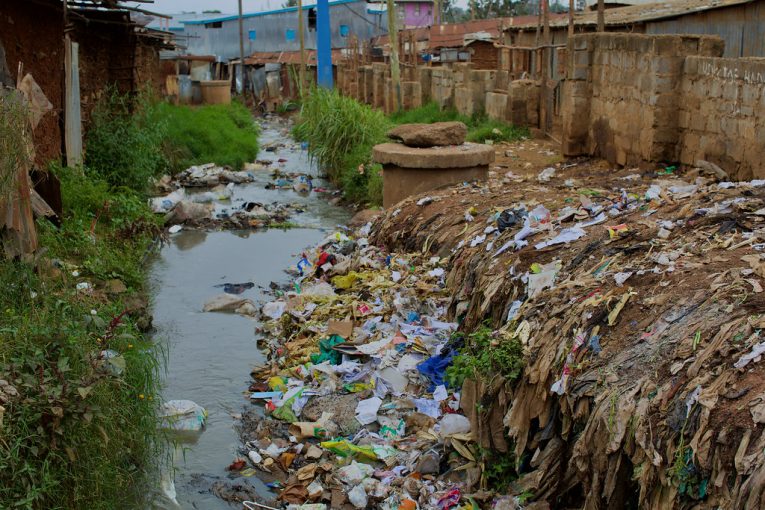

By Jenna Tooley
NAIROBI, KENYA — Delegations will meet this week at the UN Environment Programme Headquarters in Nairobi, Kenya to develop what could be the first global treaty tackling plastic pollution. This will mark the third session of the Intergovernmental Negotiating Committee. The week-long meeting commenced on Monday, November 13, addressing whether plastic management will be a unilateral or individual nation-state effort. Further discussions will involve whether to prioritize reducing plastic production or effectively managing plastic waste.
Delegations will reference a “zero draft” document that became available in the six UN official languages as of October 1, 2023. It consists of various policies and actions that will be voted on to be included in the legally binding treaty by the end of 2024. Some aspects of the “zero draft” document include primary plastic polymers, non-plastic substitutes, emissions and releases of plastic, waste management, transparency regarding monitoring and labeling, finances, and international cooperation.
The “zero draft” document accounts for various perspectives from different governments. There are three approaches to the reduction of plastic use. The first addresses a globally agreed target for reduction, similar to the Montreal Protocol. The second involves a global target for the reduction of plastic production, with restrictions on a national level which aligns with the Paris Agreement. The last approach involves each nation deciding its own targets and restrictions.
The United States, India, Saudi Arabia, and China approved the “Paris-style” agreement during the last round of negotiations that took place in Paris in May 2023. This would grant states the freedom to determine their commitments to climate action. However, many developing countries including Africa vouched for global commitments. Following the INC-2 meeting in Paris, the United States made it clear that its position on climate action and commitment to an agreement could shift. The INC-3 meeting in Nairobi will be crucial in gauging the United States’ compliance with climate change policies.
Efforts to address plastic pollution have gained momentum globally, acknowledging the need for coordinated international action. The proposed treaty establishes a framework for controlling plastic production, use, and disposal. Key goals include reducing plastic waste, promoting recycling, and addressing plastic pollution’s environmental and health impacts, especially in the marine environment.
According to the United Nations Environment Programme, global plastic production is projected to reach roughly 450 million tons by 2025. As plastic production increases, the amount of plastic pollution also increases. It is estimated that 11 million metric tons of plastics enter the ocean every year from land-based sources alone. This accounts for at least 85% of all marine litter, globally.
Plastic production is also a prominent contributor to growing fossil fuel demands and greenhouse gas emissions. If the plastics sector’s growth continues unchecked, plastics will account for 20% of global oil use by 2050. This is more per capita than personal transportation. That would result in 6.5 gigatons of GHG emissions annually by 2050, a nearly 300% increase over 2015 levels. It is also associated with chemical additives that are detrimental to human and environmental health. By 2050, the plastics sector is projected to use 2 billion metric tons of these potentially harmful additives.
Much of the debate around the proposed binding plastic treaty lies in whether to hone in on improved waste management or reduce plastic production. The European Union and many other countries including Japan, Canada, and Kenya have called for a cogent treaty with “binding provisions.” Such provisions would reduce the production and use of virgin plastic polymers derived from petrochemicals and eliminate or restrict problematic plastics, such as PVC and others containing toxic ingredients.
Notable oil exporters such as Saudi Arabia have opposed this approach and emphasize a focus on “circularity,” known as recycling or reusing plastics. They blame the excessive plastic pollution on insufficient waste management. Saudi Arabia has established a coalition with Russia, Iran, Cuba, China, and Bahrain called the Global Coalition for Plastics Sustainability. The coalition pushes for a “bottom-up” approach that holds individual countries accountable for the maintenance and environmental costs of plastics and chemicals. However, this means that the fossil fuel industry and plastics industries remain a threat and large proponent of plastic pollution.
To effectively address the multi-pronged crisis of plastic pollution, a comprehensive international legally binding instrument (ILBI) must be fit for purpose. This means it should encompass provisions on reducing plastic production, ensuring plastic products are designed for circularity, establishing a just inclusion of the informal water sector, and addressing microplastics. This agreement should be supplemented by a regulatory and implementation framework at the local, national, and international levels to ensure a consistent and sustained impact.
A well-crafted and covetous ILBI is critical to establishing a tangible impact on the interconnected global environmental crisis. It would address issues related to climate, biodiversity loss, and plastic pollution which would contribute to the betterment of public health and the environment. Facilitating effective international relations on a global scale and demanding compliance from nations is monumental towards reaching climate and sustainability goals.